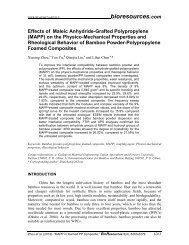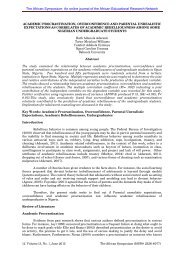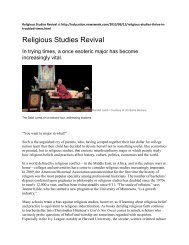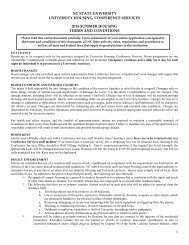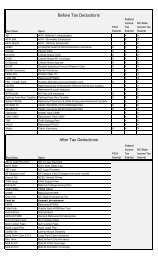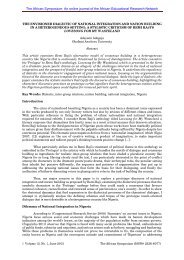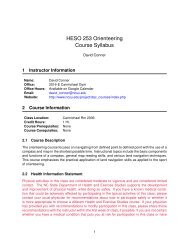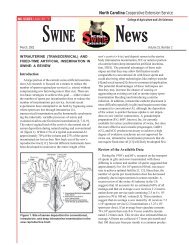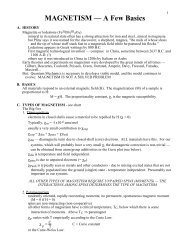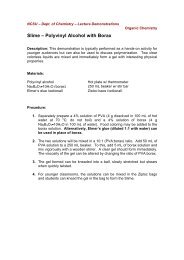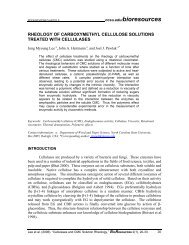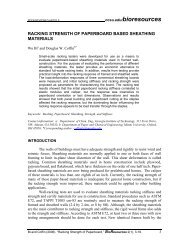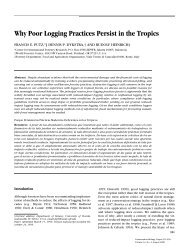Dictators, Songwriters, and the Negotiation of Censorship
Dictators, Songwriters, and the Negotiation of Censorship
Dictators, Songwriters, and the Negotiation of Censorship
Create successful ePaper yourself
Turn your PDF publications into a flip-book with our unique Google optimized e-Paper software.
Starmakers: <strong>Dictators</strong>, <strong>Songwriters</strong>...<br />
indirectly suggested in <strong>the</strong> later song (“un río de cabezas aplastadas por el<br />
mismo pie” <strong>and</strong> “los inocentes son los culpables”), <strong>the</strong> pre-Proceso direct<br />
discourse states clearly that “los que m<strong>and</strong>an… matan con descaro / pero<br />
nunca nada queda claro” because “a plena luz del día / sacan a pasear su<br />
hipocresía” (ll. 23-4, 5-6). The highly charged vitriolic lyrics <strong>of</strong> “Marcha”<br />
conclude “¡[n]o puedo ver / tanto desastre organizado / sin responder con<br />
voz ronca! / ¡mi bronca!” (ll. 40-43). The unmistakable ire st<strong>and</strong>s in clear<br />
contrast to <strong>the</strong> subtle—<strong>and</strong> nearly sublimated—poetic discourse <strong>of</strong> “Alicia.”<br />
The speaker quietly characterizes <strong>the</strong> havoc wrought upon Argentina in this<br />
way: “estamos en la tierra de todos… / ruina sobre ruina / querida Alicia”<br />
(ll. 26-28).<br />
As artists such as Charly García were forced to refine <strong>the</strong>ir writing<br />
into increasingly sophisticated lyrical systems <strong>of</strong> signification, <strong>the</strong>y were<br />
not only more successful in meeting <strong>the</strong> strictures <strong>of</strong> <strong>the</strong> Proceso’s so-called<br />
guidelines, but found greater <strong>and</strong> greater popular <strong>and</strong> critical success. As<br />
has been stated, Charly García’s b<strong>and</strong> Serú Girán became <strong>the</strong> most popular<br />
group in Argentine rock history, <strong>and</strong> “Canción de Alicia en el país” was<br />
sung with impunity before entire soccer stadiums full <strong>of</strong> fans. Such<br />
numbers could not fail to attract <strong>the</strong> attention <strong>of</strong> <strong>the</strong> regime. Nor had <strong>the</strong><br />
musicians’ ability to continue writing gone unnoticed. When <strong>the</strong> generals<br />
saw that artists could not be silenced, various attempts were made later to<br />
co-opt <strong>the</strong>m instead. As Miguel Dente recounts:<br />
El general Viola, atento a la magnitud de las convocatorias de este<br />
nuevo movimiento de música popular, invita a la casa de gobierno a<br />
García y Spinetta, entre otros, con la intención de formar la<br />
“Subsecretaría de la Juventud.” (69)<br />
Musicians, for <strong>the</strong>ir part, were beginning to enjoy a newfound<br />
empowerment, <strong>and</strong> those invited by General Viola felt safe enough to<br />
decline his <strong>of</strong>fer. In fact Charly García wrote a humorous song about <strong>the</strong><br />
experience, poking fun at <strong>the</strong> military leader. “Charly da nombre a esa<br />
famosa reunión: ‘Encuentro con el diablo’” (Dente 69). In “Encuentro,” <strong>the</strong><br />
speaker recounts <strong>the</strong> visit with mock humility <strong>and</strong> feigned self-deprecation:<br />
71



